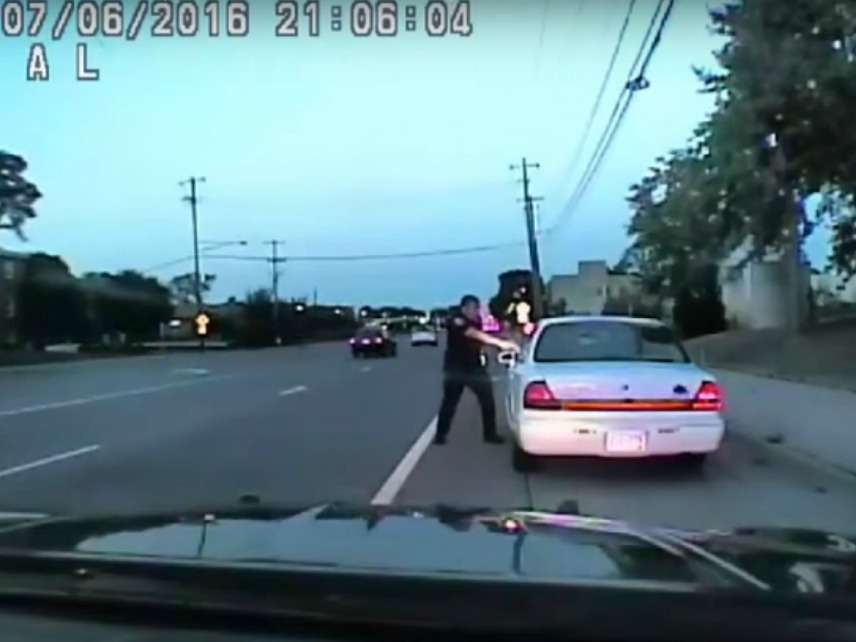Two Phony Excuses for Shooting Philando Castile
Jeronimo Yanez's defenders falsely portray Castile as a disobedient stoner.

Defenders of Jeronimo Yanez, the Minnesota police officer who killed Philando Castile last summer and was acquitted of second-degree manslaughter last week, make two interrelated claims to justify the shooting: Castile was stoned, and Castile was disobedient. Here is why those claims are either inaccurate or irrelevant.
Castile was stoned. Yanez said he smelled burnt marijuana as he approached Castile's car after pulling it over on the night of July 6, 2016, ostensibly because one of the brake lights was not working. Castile's girlfriend, Diamond Reynolds, said she regularly smoked pot with him, and when police searched the car they found six grams of marijuana inside an uncovered Mason jar wrapped in a plastic bag.
Toxicology tests found THC in Castile's blood, but post-mortem levels are an unreliable indicator of impairment because THC is stored in body fat and re-enters the bloodstream after death. Even when blood is drawn from a living source, THC levels cannot be directly tied to impairment, partly because individual responses vary widely and regular users develop tolerance. It is therefore not clear whether Castile was under the influence of marijuana at the time of the shooting or, if so, how intoxicated he might have been.
Castile was disobedient. The question of Castile's cannabis consumption is relevant only if you accept the defense argument that marijuana impaired his ability to follow Yanez's instructions, as evidenced by his failure to do as he was told. But the dashcam video of the shooting does not support the claim that Castile was uncooperative. To the contrary, he interacted with Yanez calmly and politely, handed over his insurance card as instructed, and let the officer know he was carrying a concealed firearm (for which he had a permit). According to Reynolds, whose account on this point has always been consistent, Castile was reaching for his wallet so he could retrieve his driver's license, which Yanez had also requested, when the officer became agitated.
Notably, Yanez never told Castile to stop moving, to keep his hands in plain view, or to put them on the dashboard. Instead he told Castile, "Don't pull it out," referring to the handgun. "I'm not pulling it out," Castile assured Yanez. "He's not pulling it out," Reynolds reiterated. This is the point at which Yanez freaked out, screaming, "Don't pull it out!" He immediately drew his pistol and fired seven rounds at Castile, who managed to say "I wasn't reaching for it" before he died.
You can argue that Castile should have realized his movements were making Yanez nervous or that he should have proactively put his hands on the dashboard, even though Yanez had not told him to do so. But it is not accurate to say that Castile disobeyed Yanez's commands. All the evidence suggests that Castile thought he was doing what Yanez wanted by retrieving his driver's license. It was Yanez who made mistaken assumptions about Castile (viewing him as a robbery suspect based on no real evidence, viewing him as a deadly threat after Castile disclosed that he had a gun), failed to communicate his wishes, failed to take routine precautions (such as instructing Castile to put his hands on the dashboard or stepping back from the car window), and flew into a panic within seconds.
It is true that Castile might still be alive had he acted differently. If he had never mentioned the gun, for example, he in all likelihood would have survived the encounter. But even though Minnesotans with concealed-carry permits are not legally required to tell police about their guns when they are pulled over, cops prefer that they do so to avoid scary surprises, and experts generally recommend disclosure. Castile was doing what he thought he was supposed to do when he said, "Sir, I have to tell you that I do have a firearm on me." It turned out to be a fatal mistake only because of Yanez's unprofessional, irrational reaction.
Castile could have sought to put Yanez at ease by remaining motionless with his hands in plain sight after telling him about the gun, disregarding the request for his driver's license. Had he done that, he probably would still be alive. But to say that in retrospect Castile could have been more sensitive to Yanez's nervousness is not the same as saying the shooting was justified. The onus was on Yanez, the armed agent of the state who initiated the encounter, to control the situation by remaining calm and making it clear what he wanted Castile to do. Any miscalculation Castile may have made pales beside the recklessness of the cop who killed him.


Show Comments (26)